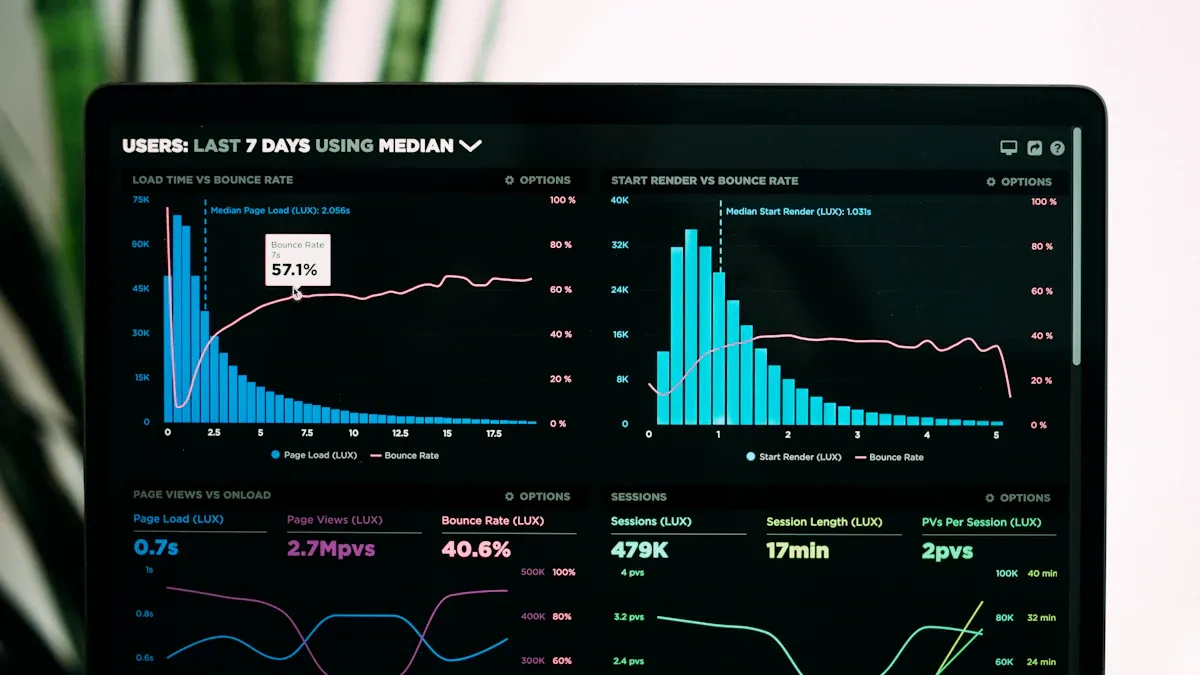- EasyCard
- Trade
- Help
- Announcement
- Academy
- SWIFT Code
- Iban Number
- Referral
- Customer Service
- Blog
- Creator
What is the Definition of New Funds? Common Misunderstandings and Correct Operations

Image Source: pexels
Many people notice that Hong Kong banks often require customers to deposit new funds when promoting high-interest time deposits, account opening rewards, or wealth management offers. Banks do this to attract more external funds into their system, enhancing liquidity. People often ask, what exactly counts as new funds? The definition of new funds clearly specifies which deposits qualify, avoiding disputes. Correctly understanding this concept can help customers seize promotional opportunities and reduce unnecessary misunderstandings.
Key Points
- New funds refer to fresh funds deposited into a bank account from external sources, such as cash, cheques, or wire transfers, after a specified date, excluding internal transfers or time deposit renewals.
- Different banks have varying baseline dates and eligibility conditions for calculating new funds, and customers should carefully review each bank’s terms to ensure the deposit timing and source meet requirements.
- A common misunderstanding is assuming that an increase in account balance equals new funds; in reality, banks strictly verify the source of funds to prevent internal transfers from being counted as new funds.
- Correct operations include confirming the baseline date, tracking fund movements, excluding ineligible funds, and using tools like Excel to assist in calculating and monitoring fund changes.
- Proactively checking the latest bank policies and keeping operation records helps avoid losing opportunities for high-interest time deposits or other promotions due to misunderstandings or oversights.
Definition of New Funds

Image Source: unsplash
Basic Explanation
The definition of new funds refers to fresh funds deposited into a designated bank account after a specific date. These funds must come from external sources, such as cash, cheques, cashier’s orders, electronic payments, or wire transfers. Banks do not consider internal transfers, time deposit renewals, or converting existing funds into different currencies as new funds. For example, in Hong Kong banks, customers wanting to enjoy high-interest time deposits or account opening promotions must ensure the funds are freshly deposited. This helps banks attract more external funds, improving liquidity.
Note: The definition of new funds is typically based on HKD, but in practice, banks convert HKD amounts to USD based on the day’s exchange rate. At 1 HKD to 0.13 USD, HK$10,000 is approximately 1,300 USD.
Calculation Method
Banks calculate the increase in new funds based on different baseline dates. Common methods include comparing the latest deposit balance with the balance from 3, 7, 15, or 30 days prior. Only the amount exceeding the baseline date’s balance counts as new funds. For example, if a customer’s account balance was USD 2,000 seven days ago and is now USD 3,500, the new funds amount to USD 1,500.
The table below summarizes the new funds definitions, minimum deposit amounts, and related conditions for several Hong Kong banks:
| Bank Name | New Funds Definition Summary | Minimum Deposit (USD) | 3-Month Time Deposit Rate Range | Application Conditions and Notes |
|---|---|---|---|---|
| HSBC | Increase in total deposit balance compared to 7 days prior, excluding new funds time deposits within 7 days | 1,300 | 2.90% - 3.10% | Rates vary for online, branch, or phone banking applications, subject to bank’s daily rate |
| Bank of China (Hong Kong) | Increase in total deposit value compared to the same currency deposit value at the previous month-end, excluding principal of new funds time deposits used in the month | 1,300 | 2.80% - 2.90% | Apply via online or mobile banking, rates subject to bank’s daily rate |
| DBS Bank | Net increase in deposit balance at time of opening time deposit compared to past 30 days, excluding principal of promotional deposits within 7 days | 6,500 | 3.15% | Online exclusive, rates subject to bank’s daily rate |
| Chong Hing Bank | Only applies to new customers without accounts in the past 12 months | 65,000 | 2.45% | Requires completing designated tasks (e.g., activating digital banking services) |
| Standard Chartered Bank | Funds deposited from other banks on the account opening day and the previous 4 working days | 1,300 | 3.00% | Apply via mobile app or online, rates subject to bank’s daily rate |
| Bank of East Asia | Increase in total deposit balance compared to same currency balance 15 days prior, excluding principal of promotional deposits within 15 days | 1,300 | 2.65% - 2.85% | Apply via online banking or mobile app, rates subject to bank’s daily rate |
| Hang Seng Bank | Increase in total deposit balance compared to same currency balance 15 days prior, excluding principal of promotional deposits within 15 days | 1,300 | 3.00% | Apply via online banking, phone banking, or branch, rates subject to bank’s daily rate |
| Citibank | Increase in total account balance compared to the previous month’s daily average balance, excluding internal transfers | 6,500 - 1,040,000 | 3.4% - 3.8% | Apply via online, branch, or phone, rates subject to bank’s daily rate |
Takungpao once pointed out that Hong Kong banks mainly have two types of new funds definitions: one is the increase in total deposits compared to the previous month-end balance, and the other is fresh funds deposited via cash, cheques, cashier’s orders, electronic payments, or wire transfers before opening a time deposit. Bank of China (Hong Kong) and Hang Seng Bank use the first method, HSBC uses the balance from 7 days prior as the baseline, while Standard Chartered considers funds deposited from other banks on the account opening day and the previous 4 working days as new funds. These differences remind customers to pay attention to each bank’s specific requirements when calculating new funds.
Tip: Customers should proactively review bank terms to ensure the source and timing of funds meet the new funds definition, avoiding loss of promotional eligibility due to misunderstandings.
Differences in Bank Definitions
Calculation Baseline Date
Different banks have significant variations in the calculation baseline date for new funds definitions. Some banks use the account balance from 7, 15, or 30 days prior as the comparison baseline. For example, HSBC calculates new funds based on the balance from 7 days prior, while Hang Seng Bank and Bank of East Asia use the balance from 15 days prior. DBS Bank compares the balance at the time of opening a time deposit with the past 30 days. These baseline dates determine when customers need to deposit funds into the account to meet the new funds definition. Customers should plan the timing of fund deposits based on the requirements of the chosen bank.
Eligible Balance
Banks also have different requirements for eligible balances. Some banks only accept new funds in single-name accounts, while others also accept joint accounts. Certain banks stipulate that new funds must be deposited via cash, cheques, cashier’s orders, electronic payments, or wire transfers, excluding internal transfers or time deposit renewals. For example, Standard Chartered requires new funds to be deposited from other banks on the account opening day and the previous 4 working days. Bank of China (Hong Kong) deducts the principal of new funds time deposits used in the month. These details affect whether customers can successfully enjoy promotions.
Note: Banks typically reserve the final right to interpret the new funds definition. Customers with questions should proactively review bank terms or inquire with the bank to ensure correct operations.
Common Misunderstandings

Image Source: unsplash
Misunderstanding Added Amounts
Many people think that as long as the account balance increases, the bank will consider it new funds. In fact, Hong Kong banks judge the source of funds based on the new funds definition. If a customer merely transfers a matured time deposit within the account to a current account, this amount will not be considered new funds. Banks only recognize cash, cheques, cashier’s orders, electronic payments, or wire transfers from external sources. For example, if a customer wires USD 2,000 from another bank to the account, this counts as new funds. Customers should clearly distinguish to avoid misunderstanding that all added amounts qualify for promotions.
Ignoring Exclusion Conditions
Many customers overlook the bank’s exclusion conditions for new funds. Hong Kong banks typically do not accept internal transfers, time deposit renewals, or converting existing funds into different currencies as new funds. For instance, if a customer transfers funds from another account within the same bank, this will not be counted as new funds. Banks clearly list which operations are ineligible. Customers should carefully read the terms before operating to ensure the fund source is correct.
Tip: Banks strictly verify the source of funds based on the new funds definition. Customers should proactively inquire to avoid losing promotions due to ignoring exclusion conditions.
Other Misconceptions
Some people believe new funds are simply a sudden increase in account funds. In fact, banks calculate the increase in new funds based on the balance on a specified baseline date. This process is not just about balance changes but is determined by the bank’s standards and operational procedures. Different banks may have varying baseline dates and calculation methods. Customers should understand each bank’s specifics to avoid missing high-interest time deposits or other promotions due to misunderstandings.
Correct Operations
Calculation Steps
When calculating new funds, customers should first confirm the bank’s specified baseline date. For example, a Hong Kong bank may require the balance from 15 days prior as the comparison baseline. Customers can refer to Chapter 4 of Super Excel Techniques for Foreign Investment Banks (eBook) for case studies, using Excel to record daily balances and calculate the difference on the specified date. Suppose the account balance was USD 2,000 15 days ago and is now USD 3,500; the new funds amount to USD 1,500. This process requires data cleaning to ensure all deposit data is accurate. Banks require double verification to check if funds come from external sources like cash, cheques, or wire transfers. Some banks may also request fund flow data in table or chart form for easier review.
Tip: Customers should periodically review account balances and set comparison baseline points to ensure each calculation aligns with the new funds definition.
Avoiding Errors
Many customers make errors during operations. Common issues include mistakenly counting internal transfers or time deposit renewals as new funds or ignoring baseline date requirements. To reduce these errors, customers can adopt the following methods:
- Before transferring funds, check the bank’s terms to confirm eligible fund sources.
- Record all fund movements and verify balances before and after the specified date.
- Use Excel or other tools for data cleaning to exclude ineligible funds.
- Regularly check bank notifications for changes in baseline dates or operational details.
- If in doubt, proactively inquire with the bank to avoid losing promotions due to misunderstandings.
Banks use statistical methods to verify the legitimacy of fund movements and establish multiple review mechanisms to ensure every new funds deposit meets standards.
Practical Suggestions
To reduce operational risks, customers can refer to the following suggestions:
- Establish Key Risk Indicators (KPIs), regularly track account fund movements, and promptly identify anomalies.
- Hold periodic family or personal financial review meetings to analyze fund movement trends and adjust strategies early.
- Use technology tools to automate account balance monitoring, enhancing anomaly detection capabilities.
- Combine qualitative and quantitative methods to assess the impact of each operation on overall financial goals.
- Continuously review the bank’s latest terms and proactively track changes in promotional details.
Note: The definition of new funds may change with bank policy adjustments. Customers should proactively review official terms and keep operation records for future reference.
These methods can effectively improve operational accuracy, reducing the risk of losing high-interest time deposits or other promotions due to misunderstandings or oversights. Through data analysis and risk management, customers can confidently seize bank promotions.
The definition of new funds helps customers correctly participate in Hong Kong bank promotions. They should carefully read bank terms to ensure fund sources are eligible. Correct operations include: confirming the baseline date, recording fund movements, and avoiding internal transfers. It’s recommended that customers proactively inquire about the latest bank information to reduce the risk of losing promotions due to misunderstandings.
Tip: Keeping operation records helps with future verification.
FAQ
What are new funds?
New funds refer to fresh funds deposited into a Hong Kong bank account from external sources after a specified date. Banks only accept cash, cheques, cashier’s orders, electronic payments, or wire transfers.
Do internal transfers count as new funds?
Internal transfers do not count as new funds. Banks only recognize funds from other banks or external sources, and transfers between accounts within the same bank are ineligible.
Must new funds be deposited in USD?
Most Hong Kong banks use HKD as the primary currency but convert to USD based on the day’s exchange rate. Customers can choose to deposit in HKD or USD.
How can I confirm that my deposited funds are new funds?
Customers can review bank terms and verify the source and timing of funds. Bank staff can also assist in confirming whether funds are eligible.
Do new funds promotions have time limits?
Banks usually set specific deposit and application deadlines. Customers should pay attention to official announcements and complete all operations before the deadline to avoid missing promotions.
New funds incentives in Hong Kong banks are appealing, but are complex source verifications and high cross-border fees holding you back? BiyaPay simplifies your financial strategy! Trade US and Hong Kong stocks directly without offshore accounts, seizing market opportunities with ease. Access a 5.48% annualized yield savings product with flexible withdrawals for optimal liquidity.
Real-time exchange rate tracking supports conversions between USD, HKD, and over 30 fiat currencies with USDT, while remittances to 190+ countries start at just 0.5% in fees, ensuring swift transfers. Join BiyaPay today to streamline your global wealth management!
*This article is provided for general information purposes and does not constitute legal, tax or other professional advice from BiyaPay or its subsidiaries and its affiliates, and it is not intended as a substitute for obtaining advice from a financial advisor or any other professional.
We make no representations, warranties or warranties, express or implied, as to the accuracy, completeness or timeliness of the contents of this publication.




Contact Us
Company and Team
BiyaPay Products
Customer Services
is a broker-dealer registered with the U.S. Securities and Exchange Commission (SEC) (No.: 802-127417), member of the Financial Industry Regulatory Authority (FINRA) (CRD: 325027), member of the Securities Investor Protection Corporation (SIPC), and regulated by FINRA and SEC.
registered with the US Financial Crimes Enforcement Network (FinCEN), as a Money Services Business (MSB), registration number: 31000218637349, and regulated by FinCEN.
registered as Financial Service Provider (FSP number: FSP1007221) in New Zealand, and is a member of the Financial Dispute Resolution Scheme, a New Zealand independent dispute resolution service provider.




















